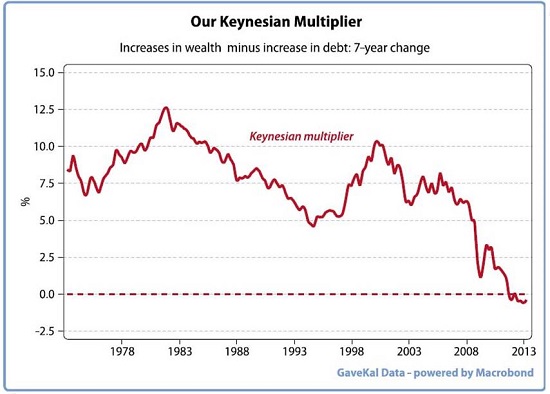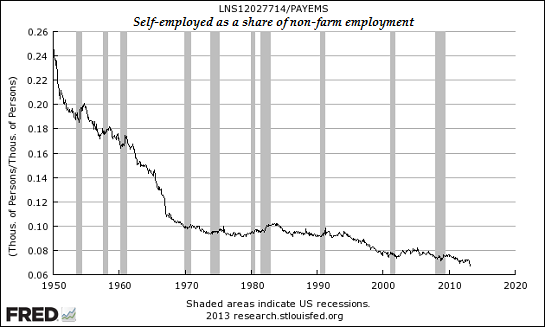A society of the increasingly overworked and involuntarily idle is not a stable or happy one.
Though I don't have any data on this, anecdotal evidence suggests the nation's workforce is dividing into two classes: the overworked and the idle. The overworked work more than 40 hours a week and are increasingly given impossible workloads, while the idle can't find any work or can only get part-time jobs with limited hours.
This bifurcation crosses income and class lines: highly paid and poorly paid workers alike are overtasked, and both the highly trained and low-skilled are idled.
The entrenched incumbents on top (the "half class"), the high-earners who pay most of the taxes (the first class), the working poor who pay Social Security payroll taxes and sales taxes (the second class), and State dependents who pay nothing (the third class).
This class structure has political ramifications. In effect, those paying most of the tax are in a pressure cooker: the lid is sealed by the entrenched incumbents on top, and the fire beneath is the Central State's insatiable need for more tax revenues to support its entrenched incumbents and growing army of dependents.
In
Bifurcation Nation (June 24, 2013), I discussed the cultural and political divides that overlay these income-based classes:
There is a palpable zeitgeist that the nation is bifurcating into two camps which no longer overlap or communicate using the same cultural signifiers and symbology.There is also a growing awareness that the divide between very wealthy and the middle income households has widened into an enormous canyon of inequality.
These classes are coalescing into a Tyranny of the Majority, where the entrenched incumbents in State fiefdoms and state-funded cartels are joined by state dependents in demanding higher taxes on the 25% who pay 90% of the Federal income taxes.
If the citizenry cannot replace a dysfunctional government and/or limit the power of the financial Aristocracy at the ballot box, the nation is a democracy in name only.
If the citizenry cannot dislodge a parasitic, predatory financial/political Aristocracy via elections, then "democracy" is merely a public-relations facade, a simulacra designed to create the illusion that the citizenry "have a voice" when in fact they are debt-serfs in a neofeudal State.
In other words, the overworked are powerless to change the system they serve.The overworked often have big mortgages to pay, kids in college, huge medical bills and a high-cost lifestyle that is a legacy of better times, a lifestyle they try to maintain even as their net income after taxes and healthcare insurance declines year after year.
The involuntarily idle are equally powerless, of course, but they tend to think the status quo is rewarding the overworked. The overworked, meanwhile, look with envy on the involuntarily idle who manage to live pretty well on government programs and transfers.
There are structural reasons why the managerial and most productive classes are increasingly overworked. Our entire economy is suffering from diminishing returns: global competition is eating away at profit margins, and increasing debt no longer boosts the gross domestic product (GDP).
To maintain profits and output, managers are given additional duties even as support staff is trimmed. I have often wondered if the fascination with the TV series Mad Men wasn't partly the result of our amazement at how little these guys actually worked and how many had secretaries/admin assistants.
This phenomenon is also visible in low-pay service work, where adverts for poorly paid administrative jobs demand familiarity with a dozen software programs, and fast-food workers are expected to maintain a punishing level of productivity for minimum wages.
This trend to loading existing employees with more work while keeping pay more or less the same is seen as cost-effective: training a new hire is both costly and risky, as once the training is complete the new hire will likely be poached by a competitor who doesn't have an expensive training program.
The overworked, from minimum wage earner to manager, are increasingly unsympathetic to workers in government fiefdoms who work less than 40 hours a week and enjoy luxe benefits and pay scales that are simply unavailable in the private sector.
Bay Area Rapid Transit (BART) unions who recently went on strike, paralyzing public transit for 6.5 million inhabitants of the San Francisco Bay Area, were apparently caught off guard by the public animosity to their demands for 23% raises on top of their 50%-above-market base salaries and unavailable-at-any-private-job benefits.
Memo to BART union members: the overworked earn on average slightly over half ($47,000) of what you earn for "driving" an automated train and staffing station offices ($80,000), and those who earn more than you in the private sector often work 50% more than your 37 hours a week in highly stressful jobs. The highly paid private-sector techies you envy constitute 2% of the workforce, and they work a lot more hours than you in intrinsically insecure industries.
The self-employed are in the Red Queen's Race, running as fast as they can to keep from falling into poverty. The self-employed pay all the taxes and healthcare costs paid by the employer, so their
Real-World Tax Rate is 75% (July 5, 2012). The self-employed people I know are working the equivalent of two jobs to earn the net of one job, and that's if they're doing well. Thus it's no surprise that the ranks of the self-employed have thinned:
The stress levels of the overworked are high due to impossible workloads, while the involuntarily idle suffer from financial stress and depression. This is one systemic reason why the nation's mental and physical health continues to deteriorate.
Yes, there are pockets of state fiefdoms and private sectors where workers are well-compensated for low-stress work, but these are exceptions, not the norm. No wonder those who can do so are quitting and filing for Social Security or tapping their 401K retirement plans to get by, or otherwise opting out of the labor force.
A society of the increasingly overworked and involuntarily idle is not a stable or happy one. Pressure is building along multiple fault lines beneath the supposedly expanding American economy. What's really expanding are stress, ill health, chronic depression, financial insecurity and the frustrations of the powerless.
Things are falling apart--that is obvious. But why are they falling apart? The reasons are complex and global. Our economy and society have structural problems that cannot be solved by adding debt to debt. We are becoming poorer, not just from financial over-reach, but from fundamental forces that are not easy to identify or understand. We will cover the five core reasons why things are falling apart:
 1. Debt and financialization
1. Debt and financialization
2. Crony capitalism and the elimination of accountability
3. Diminishing returns
4. Centralization
5. Technological, financial and demographic changes in our economy
Complex systems weakened by diminishing returns collapse under their own weight and are replaced by systems that are simpler, faster and affordable. If we cling to the old ways, our system will disintegrate. If we want sustainable prosperity rather than collapse, we must embrace a new model that is Decentralized, Adaptive, Transparent and Accountable (DATA).
We are not powerless. Not accepting responsibility and being powerless are two sides of the same coin: once we accept responsibility, we become powerful.
Kindle edition: $9.95 print edition: $24 on Amazon.com
To receive a 20% discount on the print edition: $19.20 (retail $24), follow the link, open a Createspace account and enter discount code SJRGPLAB. (This is the only way I can offer a discount.)
| Thank you, Alan W. ($5/month), for your exceedingly generous subscription to this site -- I am greatly honored by your support and readership. | | Thank you, John M. ($5/month), for your exceptionally generous subscription to this site -- I am greatly honored by your support and readership. |


 1. Debt and financialization
1. Debt and financialization

























